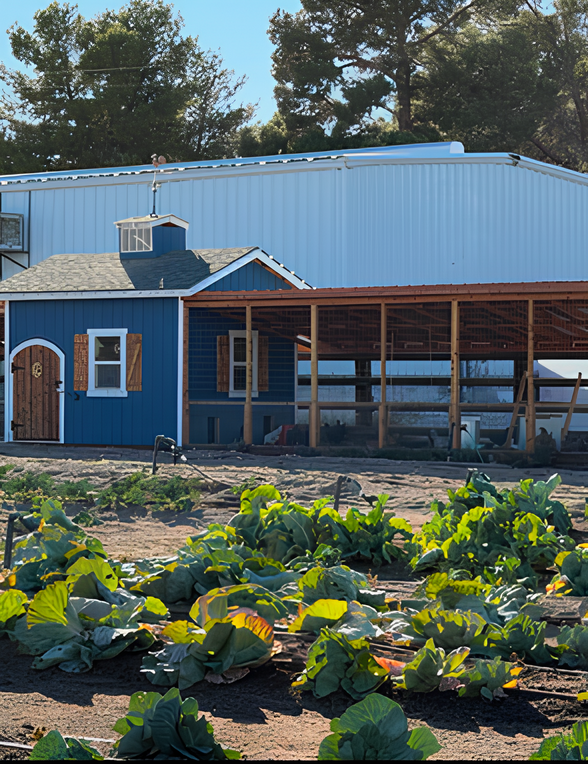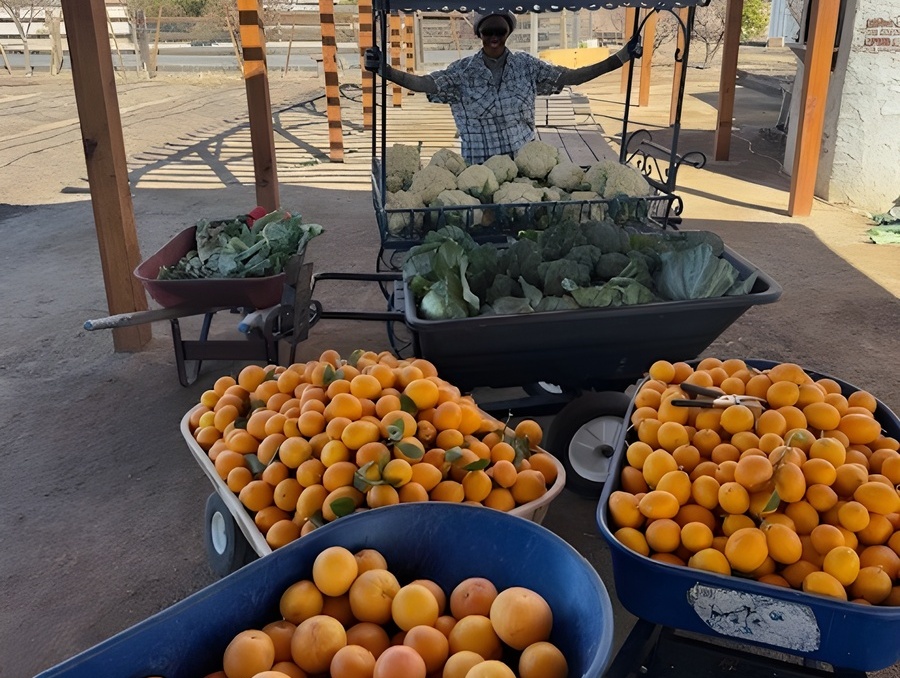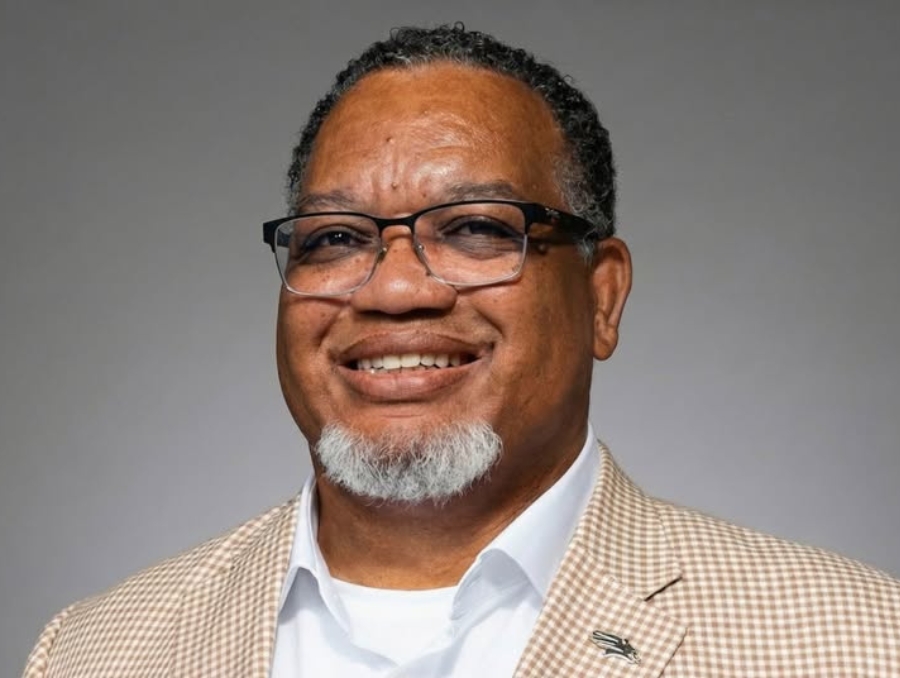What started as a struggling community garden at a local charity is now a thriving urban farm growing a wide variety of fresh produce and flowers, thanks in part to regenerative agriculture education provided by University of Nevada, Reno Extension.
Situated about 6 miles northwest of the Las Vegas Strip, Lighthouse Charities provides a workforce training program through its Rose Creek Farm, offering hands-on experience in sustainable urban agriculture. The program equips legally resettled refugees and underserved individuals and families with skills to grow herbs, flowers and vegetables, as well as raise chickens. Founded in 2014 by Cindy Trussel, a first-generation immigrant from Australia who experienced firsthand the economic difficulties of relocation, Lighthouse Charities took a new direction in 2024 when Trussel saw an opportunity to grow by embracing sustainable farming. That leap was made possible by Extension’s hands-on workshops, expert guidance and a community of like-minded growers.
“I became familiar with Extension’s Urban Agricultural Conference about a year ago,” Trussel said. “I signed up and was in search of as much information as I could get to be successful in this new program, this new social business. I learned they were teaching about regenerative farming, and that’s exactly what I wanted.”
Kaley Chapin, an Extension coordinator who leads the efforts to plan the Urban Agriculture Conference and Small Farms Conference, says the event provides in-person opportunities to connect with Extension and other producers in our state and receive tools for success.
"Extension works diligently to create opportunities like these conferences to assist producers in creating relationships and understanding what education and technical assistance is available to them,” Chapin said.
Groundwork for growth
Since it was launched more than a decade ago to provide meaningful opportunities for legal refugees, Lighthouse Charities has employed thousands of individuals through social businesses, such as a textile upcycling program and a scratch bakery run by women from Ukraine and Iran.
When the chance came to revitalize the 2-acre Rose Creek community garden, Trussel saw a bigger opportunity for what could grow and also include environmental stewardship. To achieve success, she sought as much information as possible.
She found it at Extension’s Small Agriculture Conference, where she attended a preconference workshop on regenerative agriculture led by Extension crop researcher Joe Frey.
“I knew how to grow things, but (Joe) validated everything that I had ever tried to do my whole life,” Trussel said. “He gave me that through empowerment and by emphasizing that I needed to just bring structure to what I was trying to do. Growing organically, taking care of our environment, taking care of our soils, is a real thing.”
Regenerative agriculture: more than organic farming
Regenerative agriculture goes a step beyond organic practices. Rather than relying on chemicals or external inputs, it focuses on rebuilding soil health using natural compost, and mimicking ecosystems to nourish both crops and the land they grow on.
“It’s about working with nature, not against it,” Frey said. “We’re teaching farmers how to heal their soil, grow nutrient-rich food and reduce dependence on costly inputs.”
Trussel took those lessons to heart. With help from Extension and a passionate team of volunteers, including refugee women with farming backgrounds, she implemented regenerative techniques such as vermicomposting. Today, Rose Creek Farms is home to 40,000 worms that turn food and plant scraps into nutrient-rich soil amendments, harvested and used across the farm.
From lettuce to lavender

While the farm produces staple crops such as tomatoes and peppers, its most impressive growth is happening in the flower beds. Trussel initially aimed to supply locally grown food to high-end restaurants and resorts, but she knew they couldn’t keep up with that volume. Undeterred, she found another path to success. After discovering a niche market for edible and decorative flowers, Trussel pivoted to growing zinnias, roses, lavender and more for local resorts. She’s also partnering with a local business to turn her flowers into essential oils and other wellness products.
“We’re growing vernaculars, zinnias, all kinds of flowers, edible flowers, nonedible flowers … we’ve found a huge market,” Trussel said.
In addition to flowers, the farm is integrating water-saving techniques and planning for atmospheric water harvesters to reduce reliance on municipal supplies, critical innovations for a desert city.
Learning that sticks
What sets Extension’s programming apart, Trussel said, is accessibility. Through in-person events and one-on-one mentorship, she found a community of people invested in her success.
“It wasn’t an intimidating process,” she said. “That very first conference I made friends for life.”
Even when formal class time isn’t available, Trussel said she is able to find the resources she needs since Extension instructors are just a phone call away, and there is robust information and research available on Extension’s website.
“I don't have time to take a class, but I can certainly take all of the research with me and read it and put it into practice,” Trussel said.
A vision rooted in community
Extension educators say Trussel’s success is a powerful example of what’s possible when information turns into action.
“Cindy is a no-excuses person,” Frey said. “She has taken what she's learned. She's figured out how to implement it. I think a lot of people walk away from those things and go, ‘Oh, well, that's nice in theory, but I couldn't do it because ...’ Cindy’s story is a powerful example of what happens when you give someone the tools and they run with it.”
With continued support from Extension and her own drive to create opportunity, Trussel’s vision is growing stronger every day.
“We're like sponges when we get together and we're talking,” she said. “You know, learning off of each other, and gathering as much information on what's working here and what's working there, and trying to find some real markets for some of the things that we're doing.”
The impact has been significant. In just over a year, Lighthouse has created jobs, welcomed more than 6,000 volunteers and become a model of what’s possible when education meets action.
The regenerative farming programs and classes are just one type of class offered by Extension’s agriculture education programs. The regenerative farming classes are supported in part by Western Sustainable Agriculture Research and Education, a program of the U.S. Department of Agriculture’s National Institute for Food and Agriculture. The program offers workshops statewide and online resources to help farmers, gardeners and nonprofits put sustainable practices into action. The Urban Agriculture Conference and the Nevada Small Agriculture Conference were funded by the U.S. Department of Agriculture’s Risk Management Agency.
















